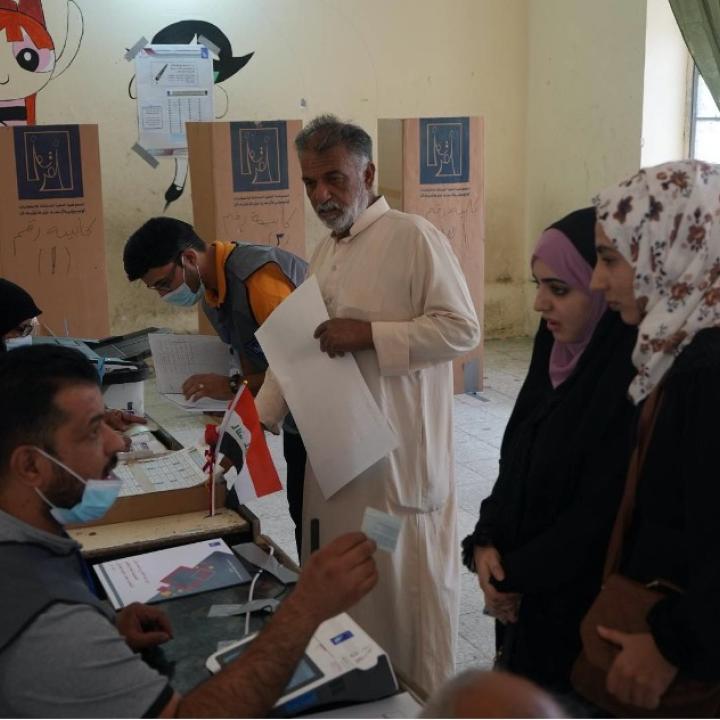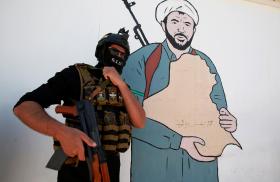
- Policy Analysis
- Fikra Forum
Young MPs of the Tishreen Movement Face Off Against Establishment Parties

With a sizable number of independents in Iraq’s next parliament, young Iraqi MPs are hoping to push the Iraqi government to finally deliver on their protest demands from 2019.
Iraq is now entering a post-election period, where the atmosphere appears to be charged and unstable as a result of agitation by the losing parties to gain seats in the next Parliament. At the same time, new young faces emerging from the heart of the Iraqi streets and the Tishreen Movement have succeeded in getting elected to Parliament. These new faces who helped call for early elections via protest are now competing with Iraq’s established political parties, which seem to have been incapable of managing the country since 2003.
For these new MPs, there are a slate of issues to tackle. In addition to the early elections and changing election laws, the youth protestors had other demands which the government did not respond to. The list includes providing job opportunities, eliminating financial and administrative corruption, improving infrastructure, holding the killers of demonstrators accountable, revealing the fate of the disappeared, and preventing the interventions of neighboring countries. While some boycotted the elections due to this frustration, others deemed participation in the political process an urgent necessity to achieve these aims.
The Independent High Electoral Commission (IHEC) announced the final results of the elections on the evening of Sunday, October 17. This came amid strict security measures imposed by the authorities in Baghdad and the southern governorates, and after people belonging to the “axis of resistance” parties threatened to stage an open sit-in in several Iraqi cities if they did not obtain seats in Parliament—in effect accusing the IHEC of rigging the results. On October 21, the IHEC announced that it had received 181 appeals for vote recounts, 174 of which were rejected and seven accepted. In light of this, the contested polling places will be opened in accordance with Article 38 of the Elections Law, and the votes will be tallied by hand.
Even as the contested votes are tallied, the outcomes at this point are generally clear. The Imtidad (Extension) Movement led by Dr. Alaa al-Rikabi—a prominent activist of the Tishreen demonstrations—won nine seats in Parliament after the popular movement’s masses decided to cast their votes for independents. The movement is working to enlist other independent deputies in order to form an opposition front within Parliament and to create a new dynamic for the political process and democracy in Iraq.
Civil activist Mahdi Salah (29) believes that the presence of young and independent politicians in parliament is a positive step toward change and will allow for laws to be enacted that can provide the type of dignified life citizens have been demanding for years. According to Salah, “The entry of young people into Parliament is a bold and positive step, but they will need patience for a long time in order to achieve the change they are seeking. This is especially since there is an accumulation of political mistakes made by the political parties since 2003 that need to be cleared away, and a new political process needs to begin that meets the aspirations of the people. We support the young politicians who came from the ranks of the protests or the independents in their next steps in Parliament.”
However, Mahdi fears that the next government will be based on political compromise, pointing out that this is contrary to what the Iraqi people have demanded, and will bring the country back to square one.
Mahdi believes that the losing parties from the Shia blocs—such as the Fatah Alliance, Huquq (Rights) Movement, Aqed Wattani Alliance, and Al-Nahj Alliance—must recalculate their positions vis-à-vis the Iraqi street rather than violently opposing the results of the elections, disrupting work in institutions, burning tires in the streets, and closing roads. There are also legal means that the losing parties can utilize to protest the election results, abandoning methods that threaten social peace in the country.
The IHEC has opened the door for candidates contesting the results of the elections to submit appeals, have them considered and receive the results within 20 days, after which the names of the 329 winning deputies will be announced. Meanwhile, Iraqi Prime Minister Mustafa al-Kadhimi stressed that results must be contested in accordance with legal procedures rather than force.
Despite calls to use legal methods of protest, the masses of the resistance factions continue to demonstrate in Baghdad and southern Iraqi cities, while security forces have closed the entrances to the Green Zone to prevent it from being breached by members of the Shia blocs that lost the elections.
As for the election winners, the Sadrist bloc, led by cleric Muqtada al-Sadr, led the way with 73 seats, followed by the Taqaddum (Progress) Alliance, led by Speaker of Parliament Mohamed al-Halbousi, with 38 actual seats. Third is Nouri al-Maliki’s State of Law Coalition with 35 actual seats, and the Kurdistan Democratic Party with 33 seats. However, about 40 seats went to independent candidates, who won as individuals unaffiliated with any blocs or political alliances.
Voter turnout levels—which were low, but considered promising by many observers—resulted from the youth sector, who had been the driving force behind the demand for early elections. Popular will led to this outcome, as well as the amendment of the Elections Law, which was based on an electoral district system differing from the electoral laws passed in Iraq after 2003.
Yet concerns remain that the losses of Iraq’s militia groups will trigger even greater unrest. Iraqi political analyst Ali al-Baydar warns that Iraq is headed towards civil war due to the tension within armed groups themselves, or with Iraqi security institutions, due to their rejection of election results they found unsatisfactory. He believes that Mustafa al-Kadhimi, Iraq’s Prime Minister, must forcefully confront any step that may ignite the expected conflict, which would be difficult to extinguish and could lead to the collapse of political organization as a whole.
Al-Baydar notes that “the Tishreen deputies will have a major role in the next phase, with their potential to tip the scales of the political scene and oblige other parties to respect their wishes. However, it will be difficult for them to form an opposition in light of the other political parties’ lust for power, and the opposition requires a deep political maturity that former deputies or the new youth lack. Nevertheless, the presence of the Tishreen youth in Parliament will lead to a generational shift capable of causing a breakthrough in the management of the country’s next phase.”
As Iraqis await the formation of the new government, they hope the resulting coalition will not be conditioned on political compromises that ignore citizens’ interests. Iraqis want a government that serves the interests of Iraqis themselves, builds foreign relationships, and promotes domestic stability. Young Iraqis, who comprise key blocs of the next government, hope these aims will come to fruition.


